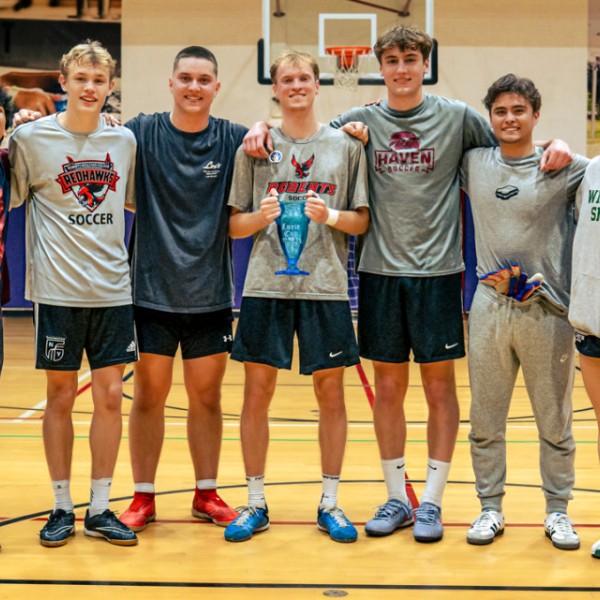Meet Aubryn Sidle, Ph.D. ’22, a new lecturer in the Department of Global Development. A former NGO executive focused on girls’ empowerment in East and Southern Africa, Aubryn has deep experience in program design, policy and evaluation centered on youth and education. She earned her doctorate in development sociology from Cornell in 2022 through research on community-led practice and measurement of adolescent girls’ empowerment in East Africa. In the classroom, Aubryn brings a passion for social justice, equity and community-driven impact to prepare students as next-generation development professionals.
How would you describe your academic focus?
Much like the Department of Global Development, my academic focus is interdisciplinary. I engage where development studies, education and gender intersect. I think many would describe me as an international education scholar, and while I agree, I also think of myself more broadly than that. Education, under the right circumstances, is a powerful mechanism for social change. I’m interested in education and other development interventions and approaches in terms of their broader implications for social justice, particularly for women and adolescent girls. In my research I’m committed to projects and collaborations that support the centering of community-based practitioners’ expertise and leadership in global policy.
What projects are you currently working on?
Last year I helped to found the Girls’ Agency Lab, or GAL (as I affectionately call her) at AMPLIFY Girls, where I continue to collaborate on research outside of Cornell. AMPLIFY is a collective of girl-serving community-driven organizations operating in 4-countries in East Africa. As the name implies, GAL is dedicated to research that understands the practice, measurement, and impact of adolescent girls’ agency as a priority outcome of interest for sustainable development policy.
Reducing gender inequality in education, and especially at the secondary and tertiary levels, is a grand challenge for development. Gross gender disparities persist at upper levels of education and those gaps tend to widen by class, race and minority status within virtually all countries (including our own). My current research projects investigate potential solutions to this challenge, such as documenting the causal relationship between girls’ empowerment and their retention/achievement in secondary school, and understanding how to measure ‘soft’ or ‘fuzzy’ capacities like agency quantitatively, and in a locally-grounded way. These are questions that are not only critical to the achievement of SDG 4 and 5 on “Quality Learning for All,” and “Gender Equality” but also have important social justice implications when we view secondary education (aka high school), and even higher education, as a human right.
Before your Ph.D. studies you worked in a leadership role in the non-profit sector. Tell us about your work there.
Running a girls’ education nonprofit was literally my dream job from the time I graduated college. I was very fortunate to have the opportunity to get to do this job starting in 2010 when I became the executive director of Advancing Girls’ Education in Africa (AGE Africa). Leading AGE Africa was an exhilarating experience for many reasons, but in part because I was located in Washington, D.C. during the period when girls’ education began to get a lot of attention from the White House. At that time, Michelle Obama and other high-profile individuals were using their influence to shine a light on a critical sector. It was also the period when the United Nations and global policy community was working to frame the Sustainable Development Goals (SDGs) and I had the opportunity to participate in the multi-stakeholder processes and events that led to SDG4 (Quality Learning for All).
My experience in the non-profit world influences what I try to teach my students. First, that shaping public policy requires both knowing how to translate data and research to a non-academic audience and the essential ability to access, build and maintain relationships with a variety of stakeholders. These are skills that I hope my students will learn. Second, the vast majority of organizations involved in development are small and locally or regionally focused, and these organizations are often left out of policy and investment conversations and decisions. The programmatic approaches and innovations from the people doing the work are largely ignored. This is both a social justice problem and a practical problem for solving the world’s pressing challenges. In my classroom we examine the power dynamics that have led to this reality and include case studies of these organizations’ work.
As a Ph.D. student at Cornell you helped develop the course “Sheroes-Global Perspectives on Girls Empowerment.” Tell us about it.
I loved teaching this course! The class re-acquainted me to my love of teaching because it combined writing with the exploration of feminist theory and girls’ empowerment. In the class we read about the lives of amazing women — people like Michelle Obama, Malala Yousafzai, Audre Lorde, and a group of girl activists in Mexico — and used different feminist theories to unpack and better understand the lived experiences of our sheroes. In practicing this type of deep analysis through popular material, I hoped students learned more about themselves as people, thinkers and writers. I’m so excited to be teaching a writing course next semester on Gender and Development that will have a similar structure to Sheroes—although instead of autobiographies we will focus on applied case studies in development.
What do you like to do when you aren’t working?
Gardening. I’m really not great with flowers, but I love growing vegetables and other food crops. Currently I’m learning about apple trees! When I was an undergrad studying in Kenya, a friend of mine told me “bila kulima, hakuna kuishi.” It means “without farming there is no living”, and I think of that phrase often because I find it to be so true—both in the literal sense that we need food to live but also in a deeply philosophical sense. For me, gardening feeds my soul and connects me and my children (who also love to garden!) to the lineage of our ancestors, who were also farmers. Some of my earliest memories are of my grandfather and his siblings out in their vegetable fields comparing the size of their tomato plants in July. On that subject, I’ll note that my tomato plants had their first red fruits in early July!
What does global development mean to you?
Social justice. I was drawn to development, and specifically education, as one potential remedy to inequality. But, as many would say, it’s very, very, complicated. The development sector, unfortunately, doesn’t always live up to this potential, and folks engaged in community development work have to be very intentional about not reproducing existing power, class, racial and gender hierarchies. Global development to me is about learning to be an ally and facilitator of processes of social change. Americans tend to think about global development as something that happens somewhere other than the United States, but that misses the bigger picture. Development is about community-led social change wherever that is happening in the world, including (and sometimes most especially), in our own home-communities.






